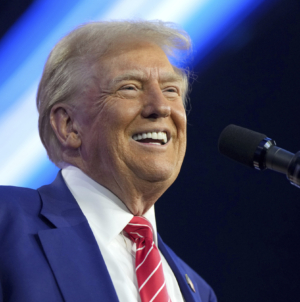-
These Spiritual Democrats Urge Their Party to Take a Leap of Faith - 30 mins ago
-
Matt Gaetz Ethics Committee Report: What to Expect in Monday’s Release - 43 mins ago
-
Visitors to Riverside’s Festival of Lights warned of parking scam - 59 mins ago
-
Letter Calling for Tracking People of Color Circulates in an Oregon County - about 1 hour ago
-
Eagles’ Jalen Hurts Officially Ruled Out With Concussion - about 1 hour ago
-
Possible rain, high surf forecast for Los Angeles area in holiday week - 2 hours ago
-
Tiger Woods Son Charlie Hits Epic Hole in One While Playing Alongside Father - 2 hours ago
-
Trump Picks a Former Treasury Official as His Top Economist - 2 hours ago
-
Winter Weather: ‘Trouble Spots’ Across US as Millions Travel for Christmas - 2 hours ago
-
Woman Dies After Being Set on Fire in Subway Car, Police Say - 3 hours ago
Prosecutors Say Sam Bankman-Fried Should Get 40 to 50 Years in Jail
Federal prosecutors said on Friday that Sam Bankman-Fried, the disgraced cryptocurrency mogul, should receive a prison sentence of 40 to 50 years for his conviction on fraud charges.
The prosecutors outlined the sentencing recommendation in a filing in U.S. District Court in Manhattan. Mr. Bankman-Fried’s sentencing hearing is scheduled for March 28, during which Judge Lewis A. Kaplan will decide his fate. He faces a maximum possible penalty of 110 years.
“Justice requires that he receive a prison sentence commensurate with the extraordinary dimensions of his crimes,” the prosecutors said in a 116-page sentencing memo to the judge.
In a separate filing last month, lawyers for Mr. Bankman-Fried, 32, argued that he should receive a sentence of no more than six and a half years.
A spokesman for Mr. Bankman-Fried declined to comment.
Just 18 months ago, Mr. Bankman-Fried was a high-flying crypto mogul, presiding over the cryptocurrency exchange FTX, a $40 billion business empire. But then FTX collapsed practically overnight, putting him in the cross hairs of law enforcement.
In November, a federal jury in Manhattan convicted Mr. Bankman-Fried of stealing $8 billion from FTX’s customers to finance political contributions, investments in other companies and lavish real-estate purchases.
FTX’s implosion and Mr. Bankman-Fried’s subsequent arrest and conviction were seen as a historic nadir for the loosely regulated crypto world.
“The crypto industry might be new,” Damian Williams, the U.S. attorney for the Southern District of New York, said after the verdict, “but this kind of fraud, this kind of corruption, is as old as time.”
Since then, the crypto industry appears to have put Mr. Bankman-Fried’s crimes in the rearview mirror. As he prepares for his sentencing, the prices of most digital assets have soared, with Bitcoin reaching a record high this month.
Mr. Bankman-Fried could face what would amount to life in prison. According to court records, a probation officer recommended a 100-year sentence, just 10 years less than the maximum. In the filing last month, Mr. Bankman-Fried’s lawyers called that recommendation “barbaric” and “grotesque.”
Marc Mukasey, the lawyer Mr. Bankman-Fried hired to prepare for the sentencing, argued in his legal filing that a 100-year sentence would be reminiscent of the 150 years given to Bernard Madoff, who pleaded guilty in 2009 to running one of the biggest Ponzi schemes in history. Any comparisons between the two men are inappropriate, Mr. Mukasey said, given “the duration and dollars” involved in Mr. Madoff’s crimes — a 20-year-long fraud that generated $64 billion in paper losses.
Mr. Mukasey also pointed out that it took a court-appointed trustee more than 15 years to return roughly $14 billion to Mr. Madoff’s investors. By contrast, the bankruptcy lawyers overseeing FTX’s unwinding have suggested that customers of Mr. Bankman-Fried’s failed exchange are likely to get back all of their money on a relatively fast timeline.
Judges are not required to follow federal sentencing guidelines. And in imposing a sentence, Judge Kaplan can consider a range of factors, including Mr. Bankman-Fried’s age, the fact that he is a first-time offender and the potential for him to be rehabilitated.
But one factor that may work against Mr. Bankman-Fried is that he chose to testify at his trial and seemed evasive at times during cross-examination. If Judge Kaplan concludes that Mr. Bankman-Fried testified falsely, he could take that into account in deciding the sentence.




















